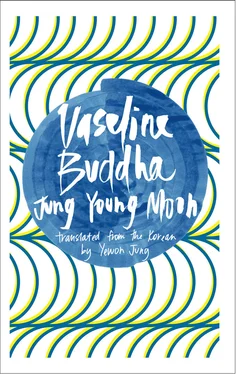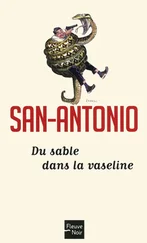Jung Young Moon - Vaseline Buddha
Здесь есть возможность читать онлайн «Jung Young Moon - Vaseline Buddha» весь текст электронной книги совершенно бесплатно (целиком полную версию без сокращений). В некоторых случаях можно слушать аудио, скачать через торрент в формате fb2 и присутствует краткое содержание. Год выпуска: 2016, Издательство: Deep Vellum Publishing, Жанр: Современная проза, на английском языке. Описание произведения, (предисловие) а так же отзывы посетителей доступны на портале библиотеки ЛибКат.
- Название:Vaseline Buddha
- Автор:
- Издательство:Deep Vellum Publishing
- Жанр:
- Год:2016
- ISBN:нет данных
- Рейтинг книги:3 / 5. Голосов: 1
-
Избранное:Добавить в избранное
- Отзывы:
-
Ваша оценка:
- 60
- 1
- 2
- 3
- 4
- 5
Vaseline Buddha: краткое содержание, описание и аннотация
Предлагаем к чтению аннотацию, описание, краткое содержание или предисловие (зависит от того, что написал сам автор книги «Vaseline Buddha»). Если вы не нашли необходимую информацию о книге — напишите в комментариях, мы постараемся отыскать её.
." — Pak Mingyu
A tragicomic odyssey told through free association scrubs the depths of the human psyche to achieve a higher level of consciousness equal to Zen meditation. The story opens when our sleepless narrator thwarts a would-be thief outside his moonlit window, then delves into his subconscious imagination to explore a variety of geographical and mental locations — real, unreal, surreal — to explore the very nature of reality.
Jung Young Moon
Vaseline Buddha — читать онлайн бесплатно полную книгу (весь текст) целиком
Ниже представлен текст книги, разбитый по страницам. Система сохранения места последней прочитанной страницы, позволяет с удобством читать онлайн бесплатно книгу «Vaseline Buddha», без необходимости каждый раз заново искать на чём Вы остановились. Поставьте закладку, и сможете в любой момент перейти на страницу, на которой закончили чтение.
Интервал:
Закладка:
And I looked at the scenes in the landscape, ignoring perspective with my eyes as I’d done before, as if looking at a painting in which perspective is ignored, and switching around the scenes in the landscape which had become messy in the process, I thought that nature was exposing, almost audaciously, the fact that it was perfectly indifferent to everything that happened to it, or hiding it, through its various faces. I looked around, thinking that there might be something that belonged to nature, a squirrel, for instance, that was watching me in secret as I thought that about nature, but I didn’t see anything. Still, I felt as if something were watching me in secret.
But such thoughts seemed dull, and I decided that I wouldn’t think anymore. Lying still, I looked up. But as often happens when I’m lying on the grass in a forest, thoughts that seemed trapped in a sort of endless repetition floated around in my mind, and they had a delicate but tenacious feel to them, which made me think that their roots were touching the roots of the grass on which I was lying, that they were taking root in the ground.
As I often do at such times, I tried to fix my gaze on an object so as to break away from tangled thoughts and drive my thoughts to a single point. But there was nothing that held my gaze. I looked around with vacant eyes. Branches were blocking out the sky. Some branches at the top of a tall tree were shaking almost imperceptibly, and the branches, which had nothing really special about them, gave off a very strange, indescribable feeling. It seemed that you would begin to shudder if you looked at them long enough, but I didn’t begin to shudder, no matter how long I looked at them. And yet the strange feeling was indescribable indeed, and although I had the feeling, it seemed that the feeling, in the end, couldn’t be mine.
Perhaps it was because the tremor of the branches that were shaking so faintly seemed like the waves of a quiet sea, which made it seem as if I were looking up at the surface from under the sea, and as if everything I saw were an underwater scene. At one point, it felt as if the trees were coral reefs, which was a very easy feeling to have, and a feeling that seemed okay to discard, so I discarded the feeling.
Still, in a brief space of time, I let the sun, which was very gradually passing between those branches, and then between those branches and the branches of a neighboring tree, pass very gradually while I was watching it, although it was of course passing as always at a regular interval, and at one point, it looked as if it were caught by the tip of a branch. It was nothing more than a feeling I had, that I was making things up in my mind, but I let myself stay in that state for as long as I wanted.
Peace of mind, which came to me so rarely that when it did come at an unexpected hour it made me feel somewhat awkward and uncomfortable, and led me to keep an eye on it, slightly suspicious because I wasn’t unaware that it would soon disappear, came to me like a rain cloud that comes dawdling, but although you couldn’t say that it had nothing to do with the peaceful landscape before me, it wasn’t just because of the landscape. Peace of mind always came for no good reason, and disappeared for even less of a good reason than when it came.
For quite some time I looked at the branches that gave off an indescribable feeling, and then away from the branches and at the sun which was slowly moving across the vast and boundless sky, and then suddenly leapt to my feet, unbuckled my belt, and began to wrap it around a tree trunk for some reason. I didn’t know why I was doing it, but it seemed that it was an okay thing to do. Anyway, the belt fit the tree perfectly, and I was pleased that the girth of the tree was the same as my own. At any rate, the belt was old, and I’d been grappling with the question of how to give it a proper end. (Even after a long time had passed, I thought from time to time about the tree around which I had wrapped a belt, and felt happy to think that somewhere, there was a tree wearing a belt, one of the few trees in the world wearing a belt, perhaps the only one. And it could perhaps stir up the imagination of those who found it.) And indicating that nature should go on doing whatever it was that it was doing, and hoping that nature, which was always silent and seemed impertinent as a result, would stay deeply absorbed in itself for ever after, I gently bent a branch that touched my hand and then let it go, thus bidding nature farewell.
I came out of the forest after that and was walking across the hill where animals were grazing in a herd, but I couldn’t tell if they were sheep or goats. The animals, white and gray and black, did not make crying sounds that would identify them as sheep or goats, and there are sheep that look almost like goats, and goats that look like sheep. Perhaps the herd consisted of both goats and sheep. Or there could be a hybrid of a sheep and a goat, although I wasn’t sure if such a thing existed, which would look like either a goat or a sheep depending on how you looked at it. It was also possible that some sheep and goats couldn’t easily distinguish between goats and sheep, which looked so much like themselves, and suspected that they were of the same species as themselves.
Without really thinking about it, I began to count the animals that I wasn’t sure were sheep or goats. But I kept having to start over at ten. The animals, which couldn’t possibly know that I was counting them, kept moving around, and the herd kept changing in form although it didn’t break off completely (for that was how a herd of sheep maintained its form).
Recalling that when I had trouble falling asleep I counted sheep or other animals, and that I stayed up a whole night once, letting more than five thousand sheep pass through my mind, I thought that counting the animals that were before me, which I wasn’t sure were sheep or goats, was different from counting animals when I had trouble falling asleep, but that I wasn’t sure what the difference was. Still, I thought that I certainly liked doing something that went on endlessly.
The sun went down over the hill where the animals were grazing and evening fell, and knowing the pleasure of walking in the evening without saying or thinking anything as mountain shadows lengthened out as much as possible and gradually got buried in darkness and quiet, and everything turned into some kind of an immovable object, I walked in the evening without saying or thinking anything, but pleasure, which seemed on the verge of arising, vanished. If anything, I felt sorrow for no particular reason, a sorrow that might be called the sorrow of evening, whose origin I didn’t know, neither to whom it belonged — and I felt that it was the quintessence of all sorrow — which was similar to what you feel when you have a dream that isn’t necessarily so sad, about yourself dying, for instance, but makes you stiff, as if paralyzed, with such heavy sorrow upon waking, and it seemed that it had something to do with how I detected a faint trace of sorrow at that moment on the hill that was spread out wide and touching the sky even though it wasn’t high. The sorrow I felt at that moment, at least, was a mixture, like all the emotions I felt, of an emotion that was stirred up for good reason at a certain moment, and an emotion that had nothing to do with the moment, which put me at ease even while I was somewhat sad. And the sorrow, along with a certain vagueness there, which seemed infused with nature’s languid sigh, something I couldn’t put my finger on, made me think again that it was Molloy’s town.
And as I walked out of the story I thought of as “Roaming in Molloy’s Town” and left the town and rode a train I recalled a memory, a memory of my childhood. In the river that flowed in front of my childhood village, there was a rock called the terrapin rock, named for the terrapins that climbed to the top of the rock and huddled together to bathe in the sun. But what I wanted to think about was not the rock, but a terrapin I saw one day on the meadow. A terrapin had come out of the river, and after taking a walk, or doing its business, it was returning to the river, when it ran into an obstacle, none other than a cow. The cow blocked the terrapin’s path, and the terrapin did all it could to return to the river, but the cow, for some reason, was doing all it could to stop it. Did the cow feel a great curiosity about the round thing that was crawling slowly? But the cow had a good reason of its own. The cow pushed around the terrapin with its mouth, and licked the terrapin’s shell with its tongue, and then kept licking it, seeing that the slightly salty taste wasn’t bad, but the terrapin, which didn’t like it, did all it could to escape the cow that was harassing it, to no avail. Things grew worse, for at that moment, two more cows came and joined the cow in licking the terrapin’s shell. Surrounded by the three cows, the terrapin tried to slip out through the twelve legs standing like a fence, but it was no use. For a while, the terrapin didn’t know where to put itself, and the cows had a good time, and in the end, the terrapin was set free only after the cows lost interest in it, having had their fill of its shell, but it was by now as offended as it could be, so it stretched out its neck and did its best to wipe its own shell with its mouth, to wash away the feel of the cow tongues that had touched it, and at last, began to make its way toward where it had intended to go, or, in other words, the river. In summers I used to climb up to the terrapin rock and dry myself after a swim in the river. When I thought of that, the sorrow I felt on the hill where evening was falling once again seemed groundless, and I scattered what remained of the sorrow out the window into the swiftly passing scenery.
Читать дальшеИнтервал:
Закладка:
Похожие книги на «Vaseline Buddha»
Представляем Вашему вниманию похожие книги на «Vaseline Buddha» списком для выбора. Мы отобрали схожую по названию и смыслу литературу в надежде предоставить читателям больше вариантов отыскать новые, интересные, ещё непрочитанные произведения.
Обсуждение, отзывы о книге «Vaseline Buddha» и просто собственные мнения читателей. Оставьте ваши комментарии, напишите, что Вы думаете о произведении, его смысле или главных героях. Укажите что конкретно понравилось, а что нет, и почему Вы так считаете.












